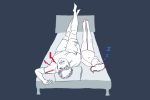Today’s generation of college students have a busier schedule than ever but, for some reason, they are not getting the sleep they need to succeed in their studies and in life.
Whether it is their studies, social life or work while attending classes is the reason for a lack of sleep, the one thing that can be guaranteed is that sleep deprivation can cause harm to not only their studies but also their lifestyle.
A routine of less than the recommended hours of sleep per night can be detrimental in the long run, as the body uses sleep and diet as the fuel it needs to run at full capacity.
Healthcare professionals recommend that the average adult receive anywhere from seven to nine hours of sleep per night but unfortunately, the majority of college students are nowhere near this mark.
Read on through this article to learn why college students need more sleep than ever to successfully complete college and have a satisfying career.
Ability to Learn
When a body doesn’t receive the recommended hours of sleep per night, sleep deprivation can start to set in. Sleep deprivation can lead to severe memory lapses and information that was easy to recall to the forefront of the mind is absent.
A college student trying to study and absorb the information needed to pass the next big test will struggle to retain even the smallest pieces of data.
Students may find themselves reading the same paragraph over and over without being able to recall any of the written words on the page. New and unlearned information is just written words on a page, but the level of comprehension to understand it is gone.
Without a solid memory, a student’s GPA will begin to slip into the red zone, jeopardizing their ability to graduate on time while fulfilling all course requirements. Proper sleep allows the mind to store memories and data at a deeper level, allowing a student the comfort of knowing what they learned that day will stay with them for the days to come.
Stress Levels
A person who doesn’t sleep throughout the night or sleep for the recommended seven to nine hours will lose their ability to stop stress from entering their life through everyday activities.
Stress levels rise when dealing with even the simplest of tasks. Whether the student has to converse with their professor or consult on a group project, it can be difficult to stay on track without allowing stress to happen. Trying to narrow down a topic or worrying about the next class will be cause for a breakdown.
Sleep allows the mind to relax and disregard all the worries of the day, reducing stress. Sleep will also reduce the amount of hormones in the body that can create stress without warning.
Reaction Time
Sleep-deprived people will show similar characteristics to those people who are slightly drunk.
Reaction time is slowed down to the point you can see a potential hazard, either physically or conversationally, arise but you are unable to do anything about it. It’s similar to watching a speeding car coming towards you but you cannot make your body move out of harm’s way.
Social Life
Sleep deprivation in college students will have just as big of an impact on their social life as it does on their academic life.
Mood swings are common in a person dealing with sleep deprivation and they find themselves prone to irritation and anger with little provocation. Conversations with peers or friends or even professors are enough to set them on edge, and they don’t have the energy needed to calm themselves down.
People who initially respected you will start to look at you differently, nervous that something they say will send your mood from peaceful to downright hostile.
Worse Physical Health
When sleep doesn’t happen on a regular or routine basis, a person’s immune system is lowered from a lack of restoration and repair to the body.
Without a high immune system, a student is more susceptible to common illnesses and viruses that thrive in close quarters. At a crucial time where attendance is needed to succeed in college and beyond, missing class due to a head cold is equivalent to missing a major event.
Without the energy to engage in physical activity and the opportunity to create good, long-lasting energy, a student will find themselves feeling run down due to the lack of sleep. Energy levels plummet to minimal levels, and they will find themselves reaching for sugary snacks and empty calories to finish the day.
This increase snacking can lead to weight gain, causing more stress on the body and its internal organs. Hence the term “the freshman fifteen!”
Conclusion
Set up a regular sleep schedule and use sheer willpower to stick to it. Unless the reason to miss sleep is absolutely crucial, maintain your schedule even on weekends or holidays.
Avoid stimulants before bed, such as caffeine or alcohol, and set aside the tablets or computers an hour before bedtime. Use your bedroom or more specifically your bed for only sleep or other intimate activities to train the brain to recognize that when you lay in bed at night, it is time to sleep.
Invest in a sturdy and proper mattress that will contour and support the body. The right mattress can be the difference between sleep and tossing and turning night after night, waking up with new aches and pains.
To find the correct mattress for you, click here. Sleep, study, sleep, socialize, sleep and succeed!
















